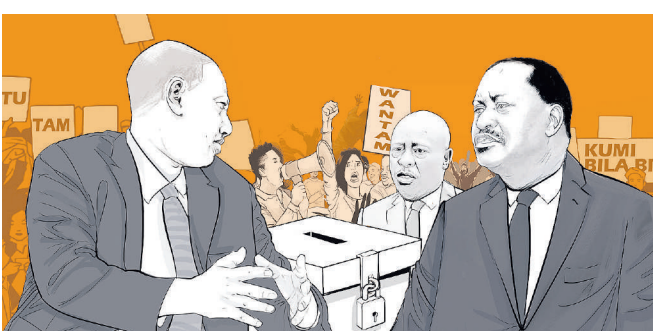

In Kenya’s evolving political arena, three
politically-inspired terms—wantam, tutam and haftam—have become markers of
political legitimacy and survival. Though informal, these acronyms refer to one-term,
two-term and half-term presidencies, respectively. They reflect deeper public
concerns about leadership, accountability and democratic performance.
This discourse is grounded in Article 142 (1) of the
Constitution of Kenya, 2010, which limits a president to two five-year terms.
But as the 2027 election approaches, these terms are increasingly shaping
political narratives, testing alliances and measuring betrayals.
Former Deputy President Rigathi Gachagua’s marginalisation
by 2024 vividly illustrates haftam—a tenure that legally seemed intact but was
soon politically eroded. His impeachment was a demonstration that wantam, tutam
and haftam are not just theoretical but are today’s political currency.
Wantam describes leadership that ends after one term,
either by choice or force. Gachagua has adopted this as a political weapon,
claiming betrayal by President William Ruto and warning that Mt Kenya’s
withdrawal of support will render Ruto a one-term president. His rallying call of
wantam
seems to resonate with his support base, predominantly Central Kenya.
Raila Odinga and Ruto have sharply condemned Gachagua’s
push for a wantam narrative, calling it undemocratic and harmful to governance.
They have dismissed Gachagua’s early 2027 campaigns, stressing that leadership
transitions should be left to voters, not personal vendettas. Raila has accused
Gachagua of putting bitterness before national unity.
Wantam has also found support among Gen Z protesters, who
use it as a form of real-time democratic accountability and mobilisation. For
them, it is not about betrayal or loyalty; it is about delivery and justice.
Tutam refers to a president completing two terms if
re-elected. Legally, this is the default. Politically, it is no longer
automatic. Ruto and his allies insist he deserves a second term to fulfil his
Bottom Up Economic Transformation Agenda. However, the youth are demanding
visible progress, not deferred promises.
For younger Kenyans, tutam represents renewed trust. They
see the presidency as a contract, not a coronation. If performance falls short,
the contract is revoked—at the ballot box, not the courtroom.
Raila, while upholding electoral accountability, has also rejected
Gachagua’s sustained tribal and transactional approach to politics. He denounced
the “shareholding” logic used to distribute state benefits based on political
loyalty.
Declaring “all Kenyans pay taxes” ,he rejected Gachagua’s
overtures of anti-Ruto alliance, including support from Mt Kenya for a 2027 bid.
Raila’s stance affirms politics of inclusion over ethnic patronage.
Once unthinkable, haftam now reflects the reality of
political demotion despite constitutional protection. Gachagua’s tenure is a
textbook case—stripped of influence and his role as Deputy President.
Haftam is not limited to the deputy presidency. At the
presidential level, Gen Z-led civic uprisings in 2024–2025 have shown that mass
dissent can pressure even constitutionally secure leaders into political limbo.
While Article 145 outlines the path for impeachment, public disapproval can
render a leader ineffective without formal removal. Haftam, then, is a people’s
verdict. It reflects a refusal to be spectators in a democracy they help shape.
Kenya’s youth, particularly Gen Z, are no longer passive
participants. Once dismissed as “digital dreamers”, they have emerged as
powerful political actors. They do not rely on political parties to channel
their dissent. They protest visibly, organise digitally, mobilise physically and
speak directly to power.
To them, wantam is a warning, tutam is a scoreboard and haftam
is a hard reset. The old model—first term for politics, second for delivery and
legacy at the end is gone. Now, the first term is the legacy, judged instantly
and relentlessly.
These new metrics are reshaping politics. Term limits still
exist, but they now intersect with performance standards. Time in office is no
longer assumed; it must be justified. For Kenya’s leaders, the message is
stark: constitutional legitimacy and coalition math are no longer enough. Survival
demands delivery, trust and transparency.
Time in office is not a gift. It is a test. And Kenyans, especially
the youth, are the examiners.
Political advisor and expert in leadership
and governance

















